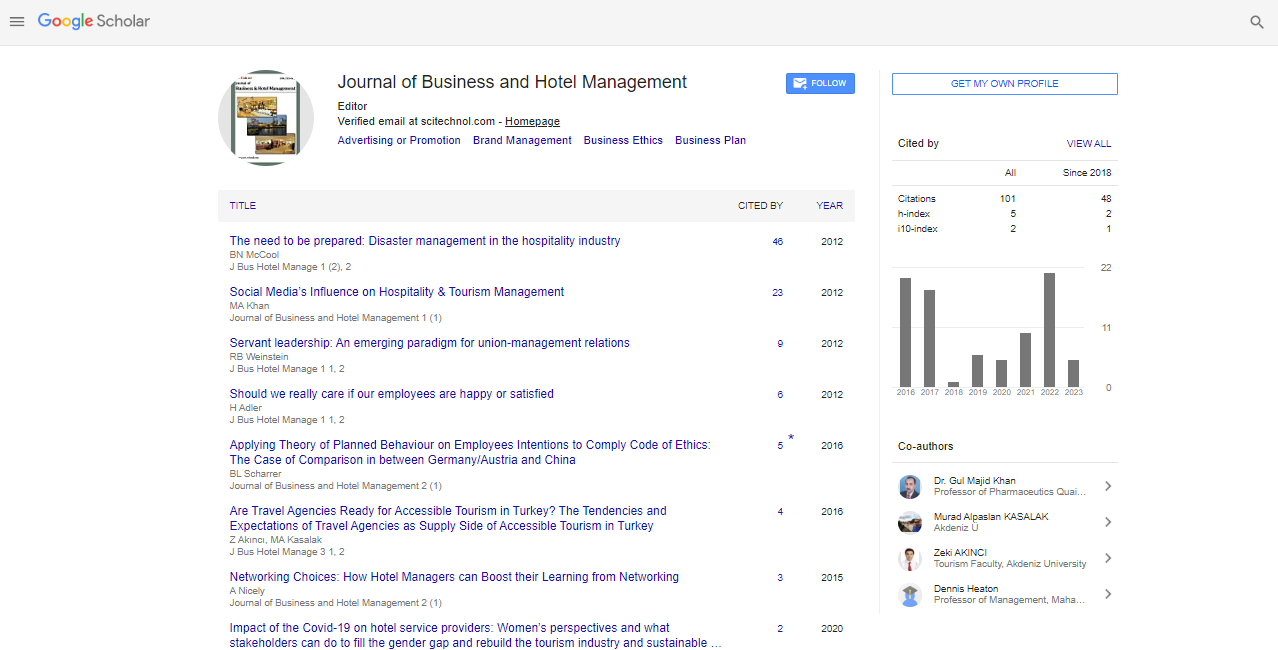Perspective, J Bhm Vol: 9 Issue: 2
Streamlining Food Service Management: Strategies for Operational Excellence
Ade Oriade*
Department of Hospitality Management, University of Central Florida, Orlando, United State of America
*Corresponding Author: Ade Oriade
Department of Hospitality Management,
University of Central Florida, Orlando, United State of America
E-mail: oriadea79@gmail.com
Received date: 15 May, 2023, Manuscript No. JBHM-23-109007;
Editor assigned date: 17 May, 2023, PreQC No. JBHM-23-109007 (PQ);
Reviewed date: 31 May, 2023, QC No. JBHM-23-109007;
Revised date: 08 June, 2023, Manuscript No. JBHM-23-109007 (R);
Published date: 16 June, 2023, DOI: 10.4172/2324-9129.1000135
Citation: Oriade A (2023) Streamlining Food Service Management: Strategies for Operational Excellence. J BHM 9:2.
Description
Food service management is a multifaceted discipline that encompasses the planning, organizing, and controlling of all aspects related to food provision in various establishments. From restaurants and hotels to cafeterias and healthcare facilities, effective food service management plays an essential role in delivering high-quality meals while ensuring operational efficiency and customer satisfaction. We will explore the key components of food service management, including menu planning, procurement, staff management, quality control, and the adoption of technology in the industry.
A fundamental aspect of food service management is menu planning. Crafting a well-balanced and diverse menu that aligns with the establishment's concept, target audience, and seasonal availability of ingredients is essential. Food service managers work closely with chefs and nutritionists to produce menus that cater to different dietary preferences and nutritional needs while keeping costs and profitability in mind. Additionally, they must ensure that the menu complies with any regulatory requirements and industry standards.
Procurement and inventory management
Efficient procurement and inventory management are vital to the success of any food service establishment. Food service managers are responsible for sourcing high-quality ingredients at competitive prices from reliable suppliers. They must strike a balance between maintaining an adequate inventory to meet customer demand and minimizing food waste. Implementing modern inventory management techniques and adopting sustainable practices can significantly contribute to cost reduction and environmental conservation.
Staff management and training
Managing a diverse team of kitchen staff, servers, and other support personnel is a precarious responsibility of food service management. Effective leadership, clear communication, and fostering a positive work culture are essential to motivate employees and ensure smooth operations. Providing ongoing training and professional development opportunities not only enhances the skills of the workforce but also elevates the overall quality of service.
Quality control and food safety
Maintaining high standards of food quality and safety is nonnegotiable in the food service industry. Food service managers must adhere to strict hygiene and sanitation protocols to prevent foodborne illnesses and contamination. Regular inspections, temperature monitoring, and enforcing proper food handling procedures are essential aspects of quality control. Implementing quality assurance programs can help identify areas for improvement and ensure consistency in the products and services offered.
Customer service and experience
Excellence in customer service is a hallmark of successful food service management. Beyond serving delicious food, ensuring a memorable and pleasant dining experience is essential for customer retention and positive word-of-mouth. Food service managers should train their staff to be attentive, friendly, and responsive to customer needs and feedback. Implementing customer feedback mechanisms allows for continuous improvement and a deeper understanding of patrons' preferences.
Embracing technology
In the digital age, food service management has been transformed by technology. From online reservations and digital menus to kitchen automation and point-of-sale systems, incorporating technology can streamline operations and enhance the customer experience. Embracing digital marketing strategies and leveraging social media platforms can also help in building a strong brand presence and reaching a broader audience.
Conclusion
Food service management is a dynamic and challenging field that requires a combination of culinary expertise, business acumen, and interpersonal skills. By effectively managing menu planning, procurement, staff, quality control, and embracing technology, food service establishments can ensure efficiency, excellence, and long-term success. With a focus on delivering exceptional customer service and staying attuned to industry trends, food service managers can navigate the competitive landscape and produce unforgettable dining experiences for their patrons.
